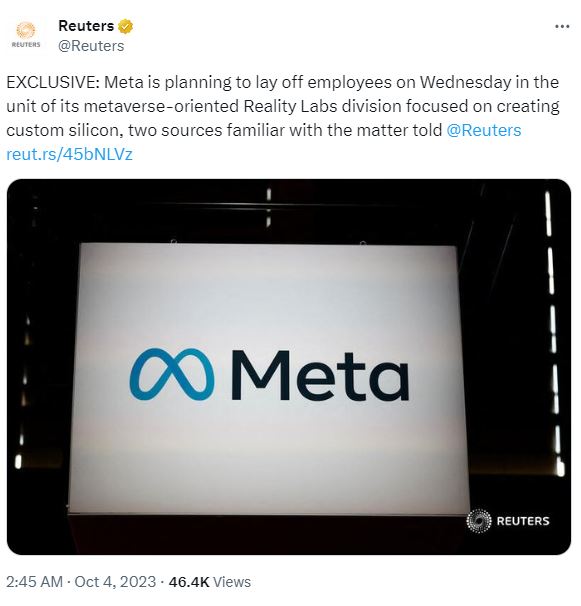
Meta founder and CEO Mark Zuckerberg speaks during Meta Connect event at Meta headquarters in Menlo Park, California on September 27, 2023. Reports show that Meta is planning another round of layoffs targeting employees working on the metaverse. (Photo by JOSH EDELSON / AFP)
As Meta layoffs hit metaverse workers, could this be the end of the dream?
- Meta layoffs target employees working on developing the metaverse
- Meta already laid off 11,000 employees earlier this year
- More companies are moving away from developing the metaverse
It was inevitable, wasn’t it? The hype on the metaverse was fading off, the technology was costly and more importantly, lots of people were returning to the office to work. The metaverse may have been Mark Zuckerberg’s dream, but it is slowly disappearing from the agenda for most organizations today.
Despite the company insisting that there is still hope for the metaverse, the decisions Meta has been making signal something else. According to an exclusive report by Reuters, the Meta layoffs, which have been going around for some time, have now eventually reached the metaverse employees as well.
Reuters reported that employees of Meta’s Reality Labs, which focuses on the technology and development of the metaverse, have been informed of layoffs in a post on the company’s internal discussion forum. The post said employees would be notified about their status with the company.
The report also explained that the cuts are expected to be focused on the Facebook Agile Silicon Team or FAST. The FAST unit, which has roughly 600 staff, worked on developing custom chips to equip Meta’s devices to perform unique tasks and operate more efficiently, differentiating them from others entering the nascent AR/VR market.
A Meta spokesperson declined to comment on the plans. Reuters also highlighted the fact that if the cuts are deep, they could hamper Mark Zuckerberg’s project to build augmented and virtual reality products enabling access to the metaverse, particularly the AR glasses that he predicted “will redefine our relationship with technology.”

Meta founder and CEO Mark Zuckerberg speaks during the Meta Connect event at Meta headquarters in Menlo Park, California, on September 27, 2023. (Photo by JOSH EDELSON / AFP)
More Meta layoffs
Earlier this year, Meta announced layoffs of up to 11,000 employees, but it seemed that they may not be the last, given the latest reports. The first layoffs took place in three rounds, with the last batch released in May.
Specifically, the Meta layoffs were part of Zuckerberg’s planned “year of efficiency” to cut costs, shake up company culture and narrow focus in response to slower growth in the tech industry. However, this did not stop the company from continuing to innovate its services.
Given the hype of generative AI, Meta has also been actively developing its own large language models and AI assistants, with several announcements made in recent months. This includes the introduction of Meta AI, an AI assistant for the company’s social media apps.
In terms of hardware, Meta has been focused on developing its augmented reality goggles with RayBan, on which it also recently announced updates. The AR device, which was initially meant to be a tool for the metaverse, seems now to have shifted focused to Meta’s AI assistant.
It remains to be seen if this will be the last round of layoffs this year by Meta, but as Reuters has pointed out, the latest layoffs, which focus on personnel developing the AR devices, show that the metaverse is not really living up to its expectations.

A Reuters report on the layoffs planned at Meta.
Back to reality
Meta may have big plans for the metaverse but it seems that other tech companies are starting to realize that the virtual reality world may not be what it initially promised. The metaverse was designed as a place where everyone could go in and do things virtually. And for companies like Meta, that included the capability to work in the metaverse.
However, with staff returning to the office to work, the metaverse seems increasingly like a pointless idea. After all, why would an employee go to their physical office just to work in a virtual office space? The idea was just not working, and companies soon realized that adopting the technology for their employees was also a costly affair.
Still, there was some hope in the metaverse for other use cases. This included entertainment and education. However, the high prices of wearables remained an obstacle for many. In fact, Disney has also moved to cut its metaverse division in 2023. In 2022, Meta’s Reality Labs reported an operational loss of US$13.7 billion and even Microsoft has shifted its focus towards developing more generative AI tools to benefit users.
Given the reduced hype on the metaverse, companies are likely to scaling down their investments on the platform. And this in turn could mean a drop in sales of the wearables needed to access the platform.
While there are gaming opportunities in the metaverse, the income it generates may not match the predictions the industry had when it first came out.
For now, it seems the metaverse is no longer a necessity, and companies that have invested in it are now thinking of how they can salvage their funds.
READ MORE
- Data Strategies That Dictate Legacy Overhaul Methods for Established Banks
- Securing Data: A Guide to Navigating Australian Privacy Regulations
- Ethical Threads: Transforming Fashion with Trust and Transparency
- Top 5 Drivers Shaping IT Budgets This Financial Year
- Beyond Connectivity: How Wireless Site Surveys Enhance Tomorrow’s Business Network



